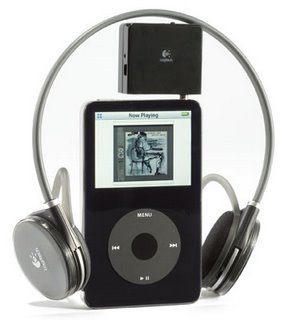 Jamie Ladion from pcmag.com has reviewed the wireless headphone from Logitech.
Jamie Ladion from pcmag.com has reviewed the wireless headphone from Logitech."While millions of people walk around with portable digital music players, I'll bet no one likes the mess of tangled wires they usually come with. Logitech's FreePulse Wireless Headphones eliminate the unwieldy cords—and cost less than $100 to boot ($99.99 list). They're the polar opposites of the Etymotic Ety8; the FreePulse headphones are inexpensive and look great, but sound just average, whereas the Ety8 headphones produce beautifully detailed audio, but are expensive and look a little bizarre.
he FreePulse consists of a pair of over-the-ear headphones, a Bluetooth plug with a 3.5mm stereo jack, and an AC adapter with two charging connectors. It's a sleekly styled pair of essentially traditional headphones, as opposed to the tiny earbuds that come bundled with portable MP3 players and music-capable cell phones these days. Since the headphones sit over the ear, in contrast to in-ear models such as the Ety8, they allow outside noise to leak in. This can be distracting if you're on a loud street or on the subway, but it's also safer when walking outdoors.
These headphones are too large to fit into your pocket; you'll either have to wear them all the time or toss them into a bag when they get in your way. They sport rubber rings for a secure fit, plus a steel-reinforced band that hangs behind your neck. Though they're easy to put on, they didn't sit evenly on my ears and felt a bit tight. No matter how I positioned them, they became irritating after about 45 minutes. I had to readjust them—resetting my comfort clock, if you will—and was then able to listen a little while longer before they became uncomfortable again.
Though the Etymotic Ety8 Bluetooth headphones might look strange, at least their 8-Mate iPod adapter is suitably sleek and lightweight. In contrast, the FreePulse's Bluetooth plug solution is somewhat bulky. The device connects to the headphone jack but doesn't hug the edge of my 5G Apple iPod, and therefore looks like it's going to fall out. In addition, the plug doesn't match most MP3 players' styling or width. Fortunately, you don't need this with Bluetooth devices such as cell phones; it's necessary only for connecting to gadgets that aren't Bluetooth-capable, such as the iPod.
Unlike with the Ety8, you need to charge both the FreePulse headphones and the Bluetooth adapter. The AC adapter splits into two charger connectors in a Y configuration. To charge the system, plug the first connector into the headphones, the second into the Bluetooth plug, and the AC adapter itself into the wall. As the FreePulse costs just one-third as much as the Ety8 with the 8-Mate adapter, all these issues are relatively minor. Also, this type of setup is common among stereo Bluetooth headphones from companies such as IOGear and Anycom.
The right side of the FreePulse headphones contains its controls. There's a power switch that also engages and disengages Logitech's Bass Boost feature, an AC power jack, and a built-in volume control. To adjust the latter, push either the "+" on the top side of the unit or the "-" on the bottom. Track-skip and rewind controls would have been welcome, but you can't have everything.
I found the FreePulse's sound quality essentially indistinguishable from that of the headphones that came with an old Sony Discman or Walkman. With the bass boost engaged, the low end is mostly mid- to upper bass with some punch, adding an artificial weight to the proceedings and giving an approximation of serious bass, but not the real thing. (Without the bass boost, they retain the boom but have no punch at all, so you'll need it). The highs don't reveal the air around instruments; the midrange is balanced and pleasant, but lacks detail. None of this will matter much in everyday listening, but it could frustrate audiophiles.
On the other hand, it was simple to pick out the bass guitar on many tracks, and the FreePulse is evenly tuned; no notes artificially stand out as a bass player moves up and down the scale. The FreePulse is not sensitive to placement; just slap them on and they sound fine. In-ear models such as the Ety8 require a precise fit and careful seal, or they'll sound vastly different (usually much worse) than they're supposed to. And you won't have to deal with cleaning eartips with the FreePulse.
Do the FreePulse headphones sound good enough for casual listening? Sure—and they're wireless, which is the whole point. I was able to walk about 18 feet away from my 5G iPod before I heard regular dropouts. Stepping behind closed doors made it worse. Logitech rates the FreePulse at 6 hours of continuous listening, less than the 6-to-10-hour range that Etymotic gives for the Ety8. In my battery rundown test, the FreePulse lasted 6 hours 22 minutes before beginning a series of musical tones indicating a low battery; they quit another 13 minutes later. That's a decent result, though you might want to carry your MP3 player's stock earbuds in your travel bag as a backup.
Think of the Logitech FreePulse Wireless Headphones this way: You're paying $19.99 for a decent set and $80 for the Bluetooth. As long as you're not expecting audio nirvana, these headphones can do the job nicely."



